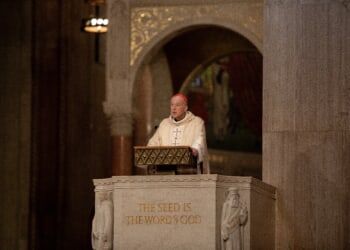I just finished teaching a six-week course that was an introduction to the Talmud. Having spent years in its study, it was a chance for me to see it with new eyes. A teacher must be in touch with the students and see things as they see them so that he can communicate rather than bloviate. Most of my students had not spent time in Talmud study before.
Moses learned, God wanted not just for Moses to listen to Him — He wanted to listen to Moses defend his people and lead them to be better.
The Talmud is vast and its text, even in translation, is not the sort of thing American readers, even sophisticated ones, are used to. I prided myself as a kid in tackling complex and deep books, so when I saw a Talmud translation in the library of my childhood synagogue, I decided to pick it up and have a go. I got nowhere. It seemed inscrutable. I lost interest in it for many years before finding a way into its wealth of meaning.
What makes the Talmud a different kind of a read is that it is not meant to be a stand-alone book, creating its own world accessible to anyone who is literate. The Talmud understands itself as the Oral Law, the context that allows the Biblical text to be properly understood and applied to life. It is linked to that Book and evokes in its pages the entire spoken culture that grew around it as it was taught and used as the guide in the life of a people.
But to say that this large set of books, the Talmud, is oral is oxymoronic. The Talmud is, after all, a book.
Ah, just so! It is a book whose purpose is to constantly evoke this thing outside and beyond its written words. It aims at what is embedded in the soul of the reader who is a part of a living community whose lie is made coherent by God’s loving gift of Himself in his Book. It is to preserve the reality of what it means to understand the mind of God and live within His will, something even the Best of Books can capture only partially. For God Himself taught Moses what His words meant, and when Moses taught His book to the people, he imitated God’s ways and explained it so that every person could understand.
Argument cannot substitute for the experience of what it means to be instructed by God, who knows preeminently well each individual’s mind. Rather, the cherished memory of that instruction has to be transmitted as a datum of experience, verified by the receivers’ own internal sense of being present within this process. It speaks to the place where the Book and the person become part of each other.
The Talmud is evoking something in the reader’s inner life that is greater than its written words. Readers are propelled inwards, to the place in their own soul where its truth resides. It is only by relying on an internal sense of God actively desiring to make His wisdom and will accessible and knowable by human beings that this work begins to unfold. And as one would expect, it demands of the reader a surpassing effort of mind, to surpass the mind’s own limits as it discerns the pathway of concentrated wisdom in the Talmud’s record of centuries of discussion.
It does so primarily by inviting us into a community of inquiry. And that is a revelation in and of itself.
Inquiry means that we seek something not yet in hand. But to admit something is not in hand seems to belie faith. If we are in truly in touch with the Source of All, what could we lack?
Scripture already answered that question: a community. Moses, on top of Mt. Sinai, enveloped in the divine cloud, is told by God: Get down from here, because your people have messed things up! He departed the divine bliss, but not before an inquiry, led by God, into the nature of what he most truly wanted.
God proposed to Moses a tempting solution: I’ll wipe this people out and make a new people starting from you. Here’s the Exodus text: “And now, leave Me alone, and My anger will burn them up and consume them and I will make you into a great nation.”
Leave Me alone? Moses had said nothing. What could that mean, given Moses intimate knowledge of God as not only just but supremely compassionate? Moses follows this thought and then knows what is being asked: God wants him to defend the nation He is intent on creating. God wants him to participate in the administration of His justice. Even more, He wants him to participate in God’s own compassion by being the people’s advocate. Moses realizes he is being asked to argue against God by God!
This is the context that makes Scripture understandable as a document that will lead and guide a people. Before all else, it requires us to inquire deeply within, of God, of our soul, and of the meaning presented to us by other people and by the world itself.
The Talmud, then, is filled with inquiries, questions that lead to deeper clarification of inner truths, drawing out how they apply practically. It does not let one be content with remaining in a cloud of bliss on top of a mountain. Even though God invites us up to the mountaintop, and we need to make that climb and immerse our spirit in the cloud of His presence, God also lets us know that this greatest of pleasures entails the greatest of responsibilities: we must go down to share what we have come to know with others.
By making Moses argue with Him on the mountain, God was demonstrating that argument in and of itself can be positive and even divine — and it can be necessary. And so, the Talmud is not afraid of differences and debates, as they can and must bring clarity to the realm of differences that is this unredeemed world. We must find the viewpoint from which the differences resolve into an integrated and whole perception shared generously with all present now and in generations to come.
What develops, then, is a sense that, if the argument is for the sake of Heaven, if it seeks the truth within and without, then all sides of that argument make us wiser and stronger. In the language of the Talmud, summing up a long-standing debate between two different schools of law, “Both these and these are the words of the living God.”
Recent American leaders flirted with restrictions on robust debate on issues of public concern. There always have been those who, believing themselves to be in the possession of the entire truth, wish to keep themselves and their power serene by silencing those who disagree with them. They think they know better who knows better.
But the American people have rejected that belief and the culture. They heard its arguments, they give it a fair shake, and they know beyond argument that it is neither wise nor whole.
The truth in its Source is whole. It addresses the place within where we are whole and bids us to broaden our grasp of it. Test our ideas against others and learn from them the ideas that work and the ideas that do not; they will benefit from this as well as ourselves. When we engage in such talk freely, we have a robust and resilient community, better able to tackle any challenge. Just so, the Talmud trained those who learned it how to endure and overcome the worst the world can throw against them — and continues to train them today.
For, as Moses learned, God wanted not just for Moses to listen to Him — He wanted to listen to Moses defend his people and lead them to be better. In the same way, God wants to hear from us — our words in search of truth and justice, led by compassion. No mere formula or algorithm can ever substitute for this fearless search. God is waiting for us to engage.
READ MORE from Shmuel Klatzkin:






![Trump's Admin Guts Another ‘Rogue Government Agency with Zero Accountability’ [WATCH]](https://www.right2024.com/wp-content/uploads/2025/03/Trumps-Admin-Guts-Another-‘Rogue-Government-Agency-with-Zero-Accountability-350x250.jpg)
![‘We All Owe Him (Elon) a Huge Debt of Gratitude’ [WATCH]](https://www.right2024.com/wp-content/uploads/2025/03/‘We-All-Owe-Him-Elon-a-Huge-Debt-of-Gratitude-350x250.jpg)









